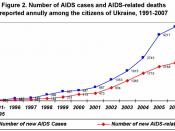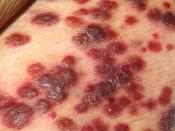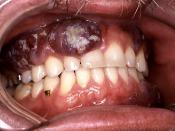AIDS-RELATED CANCERS
AIDS-RELATED CANCERS ARE a group of cancers that are more prevalent in patients infected with the human immunodeficiency virus (HIV) than in the general population. HIV is a retrovirus, a virus containing RNA and the enzyme reverse transcriptase, which enables the virus to makes its genetic material part of the DNA of the cell it invades. HIV infects CD4 cells, a subtype of white blood cells, which are important in the body's immune defense. As these cells are destroyed, the patient becomes at greater risk for developing an AIDS-related cancer, among other opportunistic infections. Since HIV is transmitted through blood and other bodily fluids, infections most commonly develop through sexual contact or contaminated injections or transfusions.
The connection between AIDS and some cancers is not completely understood, but some of the incidence may be attributed to a weakened immune system. The most common types of AIDS-related cancers are linked to oncogenic viruses.
A healthy human immune system is better able to protect the body against oncogenic viruses and to stop or slow tumor formation. However, AIDS patients are at a greater risk of developing such cancers because of their weakened immune systems.
A diagnosis for an AIDS-related cancer in an HIV-positive patient is often an indicator of the development of AIDS. An important concern for patients with AIDS-related cancers is the combination of cancer treatment with AIDS treatment, which is usually highly active antiretroviral therapy (HAART). HAART is a "cocktail drug" of several different medications and has powerful side effects. It requires that patients be exposed to only low-dose chemotherapy for their cancer(s). In addition, chemotherapy may cause other AIDS-related infections due to the debilitated state of the patient's immune system.
The most common type of AIDS-related cancer is Kaposi's Sarcoma (KS). About 20...


